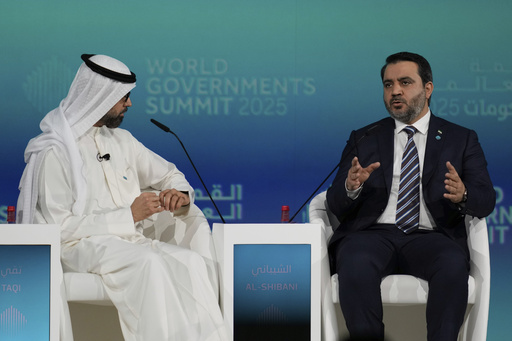
DUBAI, United Arab Emirates — The ongoing relationships between Syria, Iran, and Russia continue to be a source of distress for the Syrian population, especially given the support these nations provided to President Bashar Assad throughout the prolonged civil conflict. The new interim foreign minister of Syria, Asaad al-Shibani, made these remarks while attending the World Governments Summit in Dubai.
During his speech, al-Shibani recognized some encouraging signs from both Moscow and Tehran but did not provide specific details. He emphasized the new government’s intent to strengthen relationships with Western nations and to lift existing sanctions so that Syria could begin its reconstruction efforts after facing devastating effects from the 14-year war. “Syria has regained its freedom and dignity” after enduring several decades of tyranny, al-Shibani stated. “This marks the beginning of a new era of peace and rebuilding.”
His presence at the Dubai summit highlighted the ambition of the former rebels, who successfully forced Assad from power in December, to forge new alliances on the international front. Countries like Qatar and Turkey, which had previously had closer ties with the rebels, are now re-evaluating their relationships with the United Arab Emirates, a nation that had been at odds with them due to their support of various groups in the region. In late 2018, the UAE took a significant step by reopening its embassy in Syria, indicating a shift in diplomatic relations. Subsequently, Assad’s visit to the UAE in 2022 underscored Abu Dhabi’s position that he should be reintegrated into the Arab world, despite the violent actions carried out by his regime.
In the immediate aftermath of the December coup against Assad, a high-ranking UAE diplomat declined to confirm whether he was present in the federation. It was later confirmed that Assad had fled and was sheltered by Russia, a country that has historically been one of his closest allies, particularly under President Vladimir Putin. Al-Shibani has expressed significant concerns regarding the U.S. and EU sanctions placed on Syria, noting that estimates for reconstruction are at least $250 billion. The European Union has reported that Syria is facing a staggering 90% poverty rate, and its gross domestic product has plummeted to less than half of what it was prior to the conflict.
Al-Shibani remarked that the sanctions were imposed due to the regime’s oppression, stating, “It’s logical to lift them now.” Although relatively new to the international arena, he previously attended the World Economic Forum in Davos this year. A former participant in the 2011 protests against Assad during the Arab Spring, he has a complex history that includes using various aliases and having been affiliated with the militant group Hayat Tahrir al-Sham, which once had connections to al-Qaida. Al-Shibani was appointed as Syria’s interim foreign minister following the rebels’ swift offensive that ended the Assad family’s lengthy rule, with a new government poised to take over on March 1.
Nonetheless, the past associations of the interim government with al-Qaida raise concerns in the West regarding the legitimacy of the former rebels and interim President Ahmad al-Sharaa. On Wednesday, al-Shibani claimed that the interim administration had successfully resolved security issues and challenges related to Captagon, a drug that had been a significant source of income for Assad, particularly impacting relations with Jordan. Still, underlying tensions persist with both Russia and Iran.
Moscow is eager to maintain its military bases along the Mediterranean coast of Syria, while Iran continues to use Syria as a strategic route to supply arms to groups like Lebanon’s Hezbollah, part of its so-called “Axis of Resistance” against Israel and the United States. “The Syrian people carry wounds and pain caused by these two countries,” al-Shibani expressed regarding the roles of Russia and Iran. He further asserted, “To rebuild trust, it is essential that the Syrian people feel comfortable with these relationships.”

